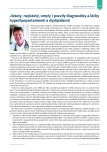-
Medical journals
- Career
Open questions from cardiovascular studies FOURIER and ODYSSEY Outcomes
Authors: Ľubomíra Fábryová
Authors‘ workplace: Metabol KLINIK s. r. o., Bratislava
Published in: AtheroRev 2018; 3(3): 209-212
Category: clinical studies
Overview
In the years 2017 and 2018, the results of two large cardiovascular trials with inhibitors of pro-protein convertase subtilisin-kexin type 9 (PCSK9i) were published and confirmed the clinical benefits of their use in patients at high risk of developing atherosclerosis-related cardiovascular disease (ASCVD). A summary analysis of FOURIER (Evolutionary Cardiovascular Outcomes Research with PCSK9 Inhibition in Subjects with Elevated Risk) study was published in NEJM [1]. In March 2018, during the ACC Congress in Orlando, the results of the ODYSSEY Outcomes Study (Assessment of Cardiovascular Outcomes after an Acute Coronary Syndrome during Treatment with Alirocumab) were presented [2,3]. Although there are a number of open questions, the results of the trials confirm that further reduction of LDL-C leads to a reduction in the residual risk of ASCVD in high-risk patients and changes the hypothesis on LDL-C „the lower is better“ to reality and the need for everyday life. In clinical practice, however, we must always carefully consider adding PCSK9i. In secondary prevention in the first line intensive statin treatment with ezetimibe and lifestyle changes remains. PCSK9i is added to patients with LDL-C ≥ 1.8 mmol/l.
Key words:
ezetimibe , FOURIER , ODYSSEY Outcomes, PCSK9 inhibitors
Received: 3. 9. 2018
Accepted: 1. 10. 2018
Sources
- Sabatine MS, Giugliano RP, Keech AC et al. Evolocumab and clinical outcomes in patients with cardiovascular disease. N Engl J Med 2017; 376(18): 1713–1722. Dostupné z DOI: <http://dx.doi.org/10.1056/NEJMoa1615664>.
- Schwartz GG, Bessac L, Berdan LG et al. Effect of alirocumab, a monoclonal antibody to PCSK9, on long-term cardiovascular outcomes following acute coronary syndromes: rationale and design of the ODYSSEY outcomes trial. Am Heart J 2014; 168(5): 682–689. Dostupné z DOI: <http://dx.doi.org/10.1016/j.ahj.2014.07.028>.
- Steg PG, Schwartz GG, Szarek M et al. The ODYSSEY OUTCOMES Trial: Topline results. Alirocumab in patients after acute coronary syndrome. American College of Cardiology – 67th Scientific Sessions. March 10, 2018, Orlando, USA. ClinicalTrials.gov: NCT01663402.
- Murín J, Čaprnda M, Kasperová V. ODYSSEY OUTCOMES. Čo priniesla táto klinická štúdia. Cardiology Lett 2018; 27(2): 76–86.
- Cannon CP, Blazing MA, Giugliano RP et al. IMPROVE-IT Investigators. Ezetimibe added to statin therapy after acute coronary syndromes. N Engl J Med 2015; 372(25): 2387–2397. Dostupné z DOI: <http://dx.doi.org/10.1056/NEJMoa1410489>.
- Catapano A, Graham J, De Backer G et al. 2016 ESC/EAS Guidelines for the management of dyslipidaemia. The Task Force for the management of dyslipidaemias of the European Society of Cardiology (ESC) and the European Atherosclerosis Society (EAS). Eur Heart J 2016; 37(39): 2999–3058. Dostupné z DOI: <https://doi.org/10.1093/eurheartj/ehw272>
- Fábryová ľ. Inhibítory PCSK9 v manažmente pacientov s vysokým kardiovaskulárnym rizikom – efektívna liečba na dosah. AtheroRev 2016;1(1): 48–54.
- Do RQ, Vogel RA, Schwartz GG. PCSK9 inhibitors: potential in cardiovascular therapeutics. Curr Cardiol Rep 2013; 15(3): 345. Dostupné z DOI: <http://dx.doi.org/10.1007/s11886–012–0345-z>.
- Cholesterol Treatment Trialists‘ Collaboration, Baigent C, Blackwell L. et al. Efficacy and safety of more intensive lowering of LDL cholesterol: a meta-analysis of data for 170,000 participants in 26 randomised trials. Lancet 2010; 376(9753): 1670–1681. Dostupné z DOI: <http://dx.doi.org/10.1016/S0140–6736(10)61350–5>.
- Ridker PM, Revkin J, Amarenco P et al. Cardiovascular efficacy and safety of bococizumab in high-risk patients. N Engl J Med 2017; 376(16): 1527–1539. Dostupné z DOI: <http://dx.doi.org/10.1056/NEJMoa1701488>.
- Ridker PM, Tardif JC, Amarenco P et al. Lipid-reduction variability and antidrug-antibody formation with bococizumab. N Engl J Med 2017; 376(16): 1517–1526. Dostupné z DOI: <http://dx.doi.org/10.1056/NEJMoa1614062>.
- Roth EM, Goldberg AC, Catapano AL et al. Antidrug antibodies in patients treated with alirocumab. N Engl J Med 2017; 376(16): 1589–1590. <http://dx.doi.org/10.1056/NEJMc1616623>.
- Institute for Clinical and Economic Review. Alirocumab for Treatment of High Cholesterol: Effectiveness and Value. Preliminary New Evidence Update. March 10, 2018. (Accessed June 24, 2018). Dostupné z WWW: <https://icer-review.org/wp-content/uploads/2018/03/Alirocumab-Preliminary-New-Evidence-Update_03102018.pdf>.
- Lloyd-Jones DM, Morris PB, Ballantyne CM et al. 2017 focused update of the 2016 ACC expert consensus decision pathway on the role of non-statin therapies for LDL-cholesterol lowering in the management of atherosclerotic cardiovascular disease risk: a report of the American College of Cardiology Task Force on Expert Consensus Decision Pathways. J Am Coll Cardiol 2017; 70(14): 1785–1822. Dostupné z DOI: <http://dx.doi.org/10.1016/j.jacc.2017.07.745>.
- Landmesser U, Chapman J, Stock JK et al. 2017 Update ESC/EAS Task Force on practical clinical guidance for proprotein convertase subtilisin/kexin type 9 inhibitors in patients with atherosclerotic cardiovascular dissease or in familial hypercholesterolaemia. Eur Heart J 2018; 39(14): 1131–1143. Dostupné z DOI: <http://dx.doi.org/10.1093/eurheartj/ehx549>.
Labels
Angiology Diabetology Internal medicine Cardiology General practitioner for adults
Article was published inAthero Review

2018 Issue 3-
All articles in this issue
- Fibrates in 2018: story goes on
- Statins, brain and cholesterol: is it going together?
- Anorexia nervosa and lipid metabolism disorders
- Atherosclerosis and cardial autonomic nervous system
- Atherosclerosis in cancer patients
- Lysosomal storage disorders as the cause of dyslipoproteinemia
- Pictures of plaques and fixed drug combination for better cardiovascular prevention
- Fixed-combination of rosuvastatin with ezetimibe in the treatment of secondary prevention patient
- Consensus statement of professional associations on prescribing of PCSK9-inhibitors
- Open questions from cardiovascular studies FOURIER and ODYSSEY Outcomes
- Athero Review
- Journal archive
- Current issue
- Online only
- About the journal
Most read in this issue- Fibrates in 2018: story goes on
- Statins, brain and cholesterol: is it going together?
- Anorexia nervosa and lipid metabolism disorders
- Lysosomal storage disorders as the cause of dyslipoproteinemia
Login#ADS_BOTTOM_SCRIPTS#Forgotten passwordEnter the email address that you registered with. We will send you instructions on how to set a new password.
- Career

